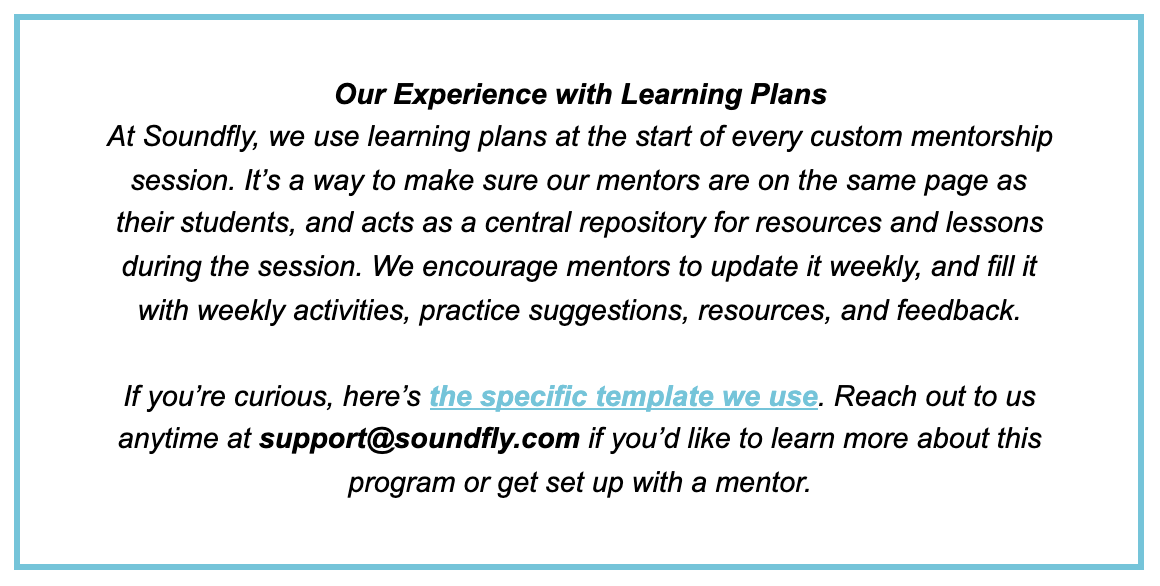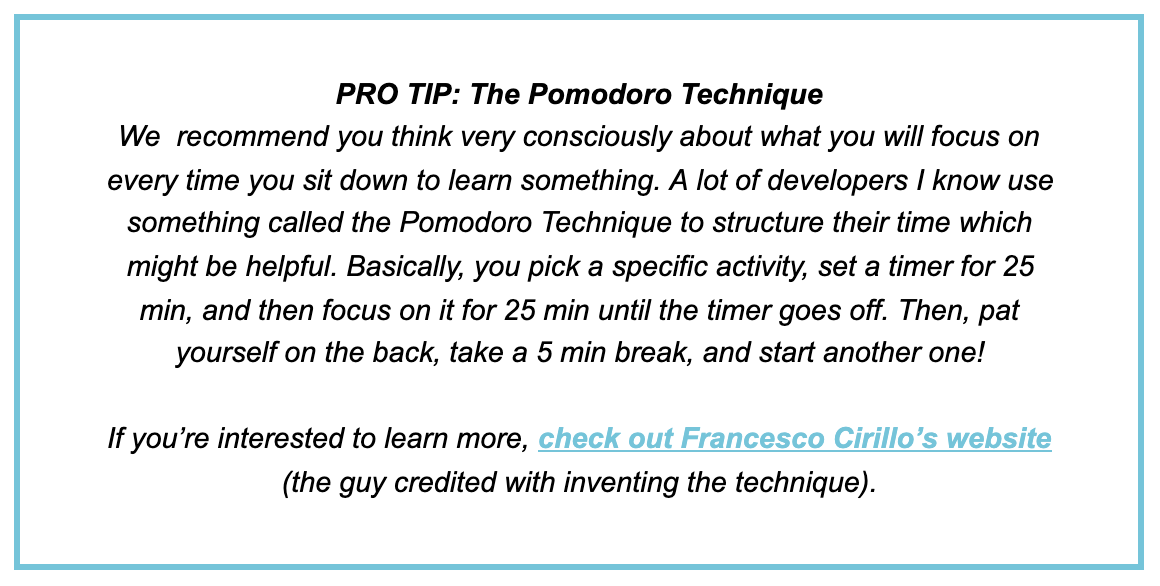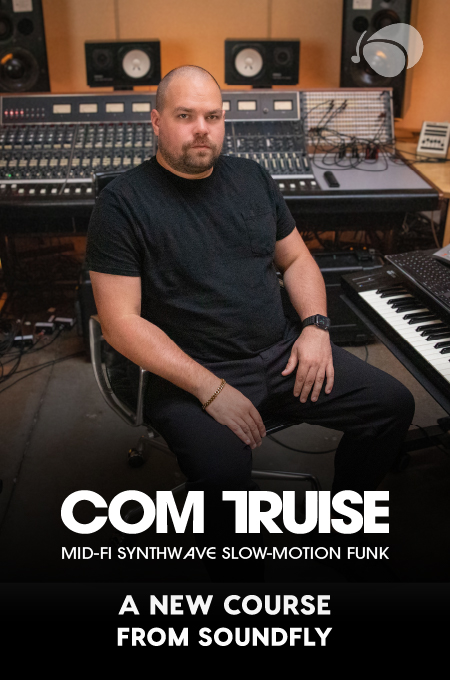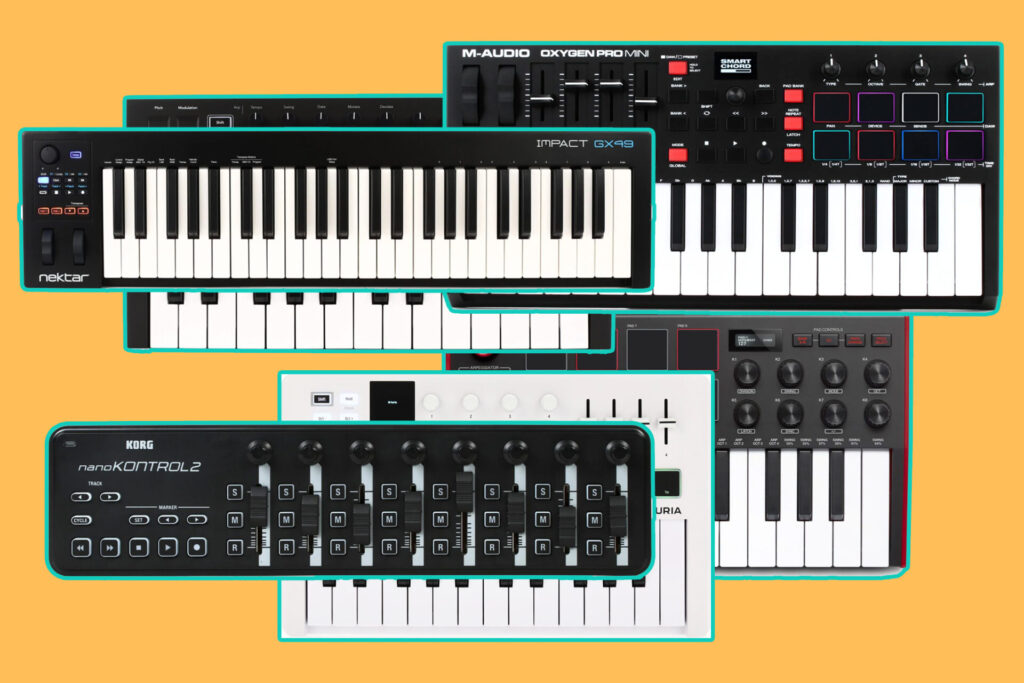*This is Section 2 of our Guide to Learning Things Online, to go back to the Introduction, click here.
9 Tips for Getting More out of Online Learning
Below are some of the things that we do recommend in order to get the most from an online learning experience, either on Soundfly or elsewhere.
- Tie your learning to your big picture goals
- Create a personal learning plan for yourself
- Practice active learning
- Create structured time for practice
- Create good habits of learning
- Space out your learning over time
- Seek out feedback and accountability
- Create time for reflection
- Share your learning
Let’s take a closer look at how these work.
1. Tie Your Learning to Your Big Picture Goals.
Learning is more effective when it’s relevant (here’s a citation). Most of us, though, take a haphazard approach to online learning, poking around in topics as we find them and dropping off just as quickly. Or, we sign up for a course and expect the instructor to do all the work of making it relevant to our needs.
Before you start any learning journey, spend some time getting clear on your big picture goals and where you’re headed. Create a North Star (or a couple). Then, figure out what you want to learn to help you get there.
Doing this exercise in advance will not only help you choose the right course or create the right program for your needs — it’ll also help you prioritize your time, focus your energy on the right stuff, and stay motivated.
For example, let’s say I’m a producer hoping to make electronic music. I’ll create some North Stars for myself: In the next year I want to produce and release a five-song EP; my inspirations will be Jon Hopkins and Bonobo; and the first step in my learning plan will be to take a course on how to use Logic Pro. Throughout, I’m going to filter my learning through those specific types of music wherever possible.
2. Create a Personal Learning Plan for Yourself.
There are a few problematic approaches to online learning I see a lot: either we look for things in the exact moment we need them, or we stumble on something that looks interesting and dive in without a lot of thought. One involves constantly patching leaks and the other essentially puts our learning entirely in the hands of someone else.
What if, instead, you created a learning plan that outlined how you intend to approach your learning for a certain course or period of time?
Here are two approaches:
- Create a learning plan at the start of any new learning experience or course.
- Create a learning plan every few months to make learning a consistent part of your routine.
What should be in your learning plan? We recommend a few things:
- Your North Star or big picture goals
- Your key learning objectives & outcomes (i.e. what you hope to be able to do by the end)
- What resources you aim to use for your learning
- A planned schedule for your learning
- A commitment to a certain learning routine
- Taking notes and tracking specific achievements as you go
We’ve put together a template for you based in part on what we use during our custom mentorship program.
I also really like this one I found from David Perell for his course “Write of Passage.”
3. Practice Active Learning.
When most people think of online learning, their mind immediately goes to watching videos, which is a passive form of learning. As we already talked about in this guide, that’s not the best way to learn! The concepts you learn will sink in better if you engage with them more deeply.
There are a number of ways you can do this: You can quiz yourself on the information you’re learning as you go; you can reflect upon what you learn afterwards; you can explain it to a friend, putting concepts into your own words; you could use the stuff you learn to create projects; or you can practice what you’re learning along the way.
As this slightly facetious Education Week article so eloquently puts it:
“Students who do stuff also do more stuff, and they do stuff better.”
It’s remarkable so many online learners skip this part.
4. Create Structured Time for Practice.
We recommend that learners think about practice more like training. An athlete trains to get better at their sport, focusing in on the areas they need to work on through specific activities that target those areas.
One of the methods we train our mentors in is something called “deliberate practice.” Deliberate practice is the idea of laying out a specific goal or purpose to your practice sessions to target the areas where you’re weak and improve them. Here’s a good overview from author James Clear.
Taking a deliberate approach to practice might mean focusing on writing verse melodies specifically rather than complete songs; or trying to mimic specific synth sounds to have more control over your sound design skills; or playing a specific left hand part of a piano piece multiple times without making a mistake. These are the sorts of practice efforts that target a specific skill and help you to improve that skill specifically.
Some courses will provide specific activities for you in this vein, whereas in others, you’ll need to create your own practice plans. Regardless, we recommend you be intentional in your practice approach by:
- Laying out a specific intention for each practice session
- Focusing your practice on the areas you most need to improve
- If possible, getting feedback (or self-critiquing) to help you find those areas of focus
- Gradually escalating the level of difficulty over time to stay motivated
If you’re interested in other good practice techniques, I’ve written about this in more depth for the music publisher Alfred Music.
5. Create Good Habits of Learning.
Learning things online is like trying to write a novel in the middle of a crowd of soccer hooligans. The distractions are constant, loud, and overwhelming. There are a few ways to give yourself a fighting chance against this madness:
- Set up a specific learning environment where you can focus with the gear you’re going to need in advance.
- Remove distractions by leaving your phone in the other room, closing out browser windows, and muting notifications.
- Set aside specific times for learning, possibly using the Pomodoro Technique we outline below.
- Reward yourself frequently for achieving focus, making progress, or hitting milestones.
Charles Duhigg’s The Power of Habit might be a good read if you’re interested in learning more about how to take control of your habits.
6. Space Out Your Learning Over Time.
In her excellent course “Learning How to Learn” on Coursera, Dr. Barbara Oakley repeatedly says the line “good learning is a bit-by-bit activity.” Cramming is not effective at creating the sorts of paths in your brain that will make it stick, whereas spacing out your learning is one of the most reliable ways to learn.
If you plan to go through an entire course in a single sitting, you might solve an individual problem, but you likely won’t really improve as much as you hope for. Instead, plan to take it step-by-step, addressing one section at a time with breaks in between.
Admittedly, it’s harder to stick with something for a month or more than just race through it, so make sure you set aside some time in advance!
7. Seek Out Feedback and Accountability.
This can be a little tricky, but we encourage you to find ways to build accountability and feedback into your course. One simple way is just to tell other people about the course you’re taking! Speaking about it out loud can deepen your commitment, even if no one ever follows up with you about it.
Many online courses also have community forums or discussion groups. For example, at Soundfly our subscribers get access to our community Slack group. It can be useful to take advantage of those resources to post works-in-progress with specific requests to help your peers target their feedback in useful ways. For musicians, I’ve also seen people have a lot of success sharing on Reddit.
When seeking out feedback, asking for a take on a specific part of an activity will almost always produce better results than simply asking “what do you think?”
8. Create Time for Reflection.
We’ve already talked about how reflecting on your learning reinforces active learning. Reflecting helps relate the things you’re doing to the concepts you’ve been learning, and allows you to tie those things to your larger goals. It also helps you hone in on and target areas of your learning for deliberate practice and practice recall in the process.
Another useful activity that comes up in almost every custom mentorship session we do is laying out who your models are. Analyzing the work of others is always a valuable learning exercise, and can help you better figure out where to focus on your own projects and learning. This is a great thing to do during a reflection session — and allows you to connect with your North Star as well.
9. Share Your Learning.
Our final recommendation is to share the things you’ve learned and the results of your learning with your community! For one thing, putting what you’ve learned into words can help it stick. For another, it can be a powerful motivator and accountability tool.
Doctors often use the “see one do one teach one” approach to training because if you can effectively teach something, then you know you’ve learned it. Sharing can work the same way!
You can borrow from the actions of one of our students, Ritwik Deshpande, and write a blog post about what you’ve learned — or, you know, just tell your partner over dinner one night. There are lots of ways to share!
How about starting by sharing what you’ve learned from this guide? Tag us at @learntosoundfly on Instagram, Facebook, or Twitter, and we’ll join the conversation!
Further Resources on How to Learn:
- “Learning How to Learn.” One of the most popular Coursera courses of all time, it gives a really good overview of how people learn, with lots of extra readings and links. Their 10 Dos and Don’ts PDF is a great quick overview.
- The Anti-Extinction Roadmap for Modern Professionals. A fantastic overview of how to be an effective self-learner from startup Zest.
- Peak. Anders Ericsson is the world’s reigning expert on “expertise,” and in this book he details a powerful new approach to mastering almost any skill.
- Make It Stick. Learning something “the hard way” implies wasted time and effort. Make It Stick turns this idea on its head, and argues that the best learning requires self-testing, escalating difficulties, interleaving skills, and more.
- The Power of Habit. A fascinating look at how corporations, countries, and individuals retrained their habits to improve their work and in many cases, lives. At its core, this book posits the key to exercising regularly, losing weight, being more productive, and achieving success is understanding how habits work.








